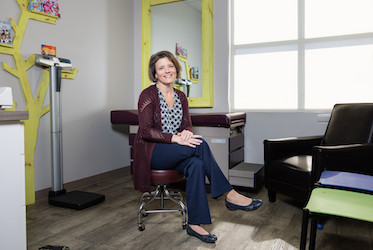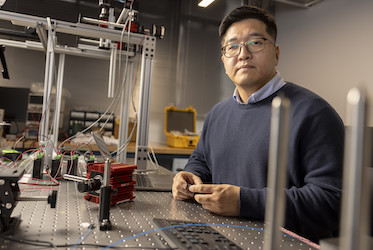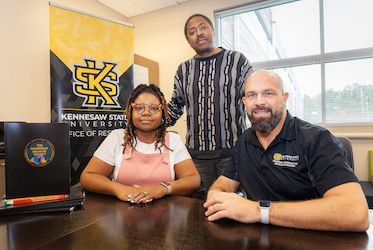
Driving Innovation
KENNESAW, Ga. | Jul 6, 2017
Mechatronics engineers explore autonomous vehicle technology

Autonomous vehicle technology – which allows navigation without human input – is already mainstream, explained Kevin McFall, assistant professor of mechatronics engineering at Kennesaw State and an artificial intelligence researcher. Every leading car manufacturer – such as Tesla, Mercedes, Subaru, Ford and Chevrolet – has some form of this technology integrated into their vehicles.
Students at Kennesaw State are learning how to build these various technology systems and integrate multiple assist systems to create an autonomous vehicle.
“Assist technology is where the car is doing some of the functions autonomously but still requires constant attention from the driver,” he said. With parking assist, lane-keeping assist, or adaptive cruise control, the autonomous system can control steering and speed or both simultaneously, but a human is still needed to engage or disengage the autonomous system and take control when necessary.
Each semester, graduating students are required to produce a “functional, working, real-life prototype” as part of their senior capstone projects.
“This is a great opportunity to practice and keep up with the field,” said Edward Sheeran, a mechatronics student. “We have to start somewhere – even with a shoestring budget of $300.”
According to McFall, self-driving cars epitomize what mechatronics students create in their degree program.
“They are really pushed and their project will fail if, on demo day, it doesn’t do as it is supposed to,” McFall said. “Mechatronics is really ‘sense, think, act.’ Take information from your surroundings and make some decision based on that information to make some action happen in real life. That’s a self-driving car.”
Industry Connections
Chan Ham, chair of the Mechatronics Engineering department, explained there will be a huge demand for self-driving car engineers in the future.
“Our students will be confident facilitators in the real engineering world,” Ham said.
That future industry is growing as more and more car manufacturers adopt new technologies in their vehicles. Carmakers Kia and Atlanta-based Wheego already have provided cars to the university’s mechatronics program.
In a recent string of external donations to the mechatronics department, Wheego donated $15,000 for student scholarships and provided a vehicle, which will be used in developing car drive-by-wire capability that can be controlled remotely from a call center.

Expanding Research
Besides teaching how to develop various autonomous systems, research in this field at Kennesaw State is expanding.
McFall and Ying Wang, associate professor of mechatronics, are finding their niche in the Southern Polytechnic College of Engineering and Engineering Technology for developing and understanding autonomous vehicle technologies. Several of their research projects have involved graduate and undergraduate students interested in working and researching in the field.
“Autonomous vehicle technology is an emerging multidisciplinary system that will significantly contribute to our synergistic collaboration between faculty and students,” Ham said.
McFall’s interests lie in artificial intelligence and artificial neural networks, and his latest project relates to the speed information of the car and using that to control the pedal to maintain the car at a given speed.
“There is so much data there, and it needs to be analyzed to improve these sensor systems,” McFall explained. This data is important even in practice, as the students use “artificial neural networks to extract useful information and possibly give a steering command for the car to be able to stay on track.”
McFall has published research on detecting road boundaries from camera images. Upcoming technologies are now using lidar – a light, distance and ranging system in which a laser scans in all directions to generate a 3D map of what’s surrounding the vehicle.
Wang is working on a more interdisciplinary research project with several KSU engineering faculty to develop the Slim Modular Flexible Electric Bus (SMFe-bus), a viable solution to make Bus Rapid Transit (BRT) more appealing to commuters and more cost-effective for communities.
The SMFe-bus is an electric-powered bus that has a lead module with a human driver and a few driverless modules, strung together without being physically attached to the lead vehicle or each other. Each module is self-propelled by in-wheel electric motors.
Wang is specifically working on the virtual coupling technology that blends camera and sensor technologies with intelligent control technology.
“Our prototype explores the neural network and benefits from artificial intelligence technology, and how a machine, or robot, learns how to accept information from humans,” said Wang.
He explained that significant progress in computer vision technology, such as cameras to classify objects, and the speed of today’s graphics processing units are improving high-level decision-making for the autonomous vehicle industry.
Beyond cars and buses, the university’s Autonomous Underwater Vehicle (AUV) student competition team also designs, manufactures and programs an AUV. Using autonomous technology, the team builds a robotic submarine that can perform a series of commands without any human interaction, and competes nationally against other collegiate teams at the RoboSub competition in San Diego. In 2015, the team took home a top prize for “Best Innovation on a Budget.”
McFall said Kennesaw State is finding its niche in researching this new technology.
“We can nibble around the edges where we can until we are able to be more of a power player,” he added.
That time may soon be here as the technology becomes more common in the marketplace.
“It’s fun to drive, it’s a big part of our culture, but that could shift,” McFall said. Today, we ride horses for fun; maybe we’ll only drive cars for fun in 50 years.”
– Tiffany Capuano
Photos by Lauren Lopez de Azua
Related Stories

Kennesaw State researcher applies mathematical modeling expertise to health care systems

Kennesaw State receives grant to help children with sickle cell disease

Kennesaw State receives $2.5 million grant to foster student success in calculus

Kennesaw State engineering graduate has literally come a long way
A leader in innovative teaching and learning, Kennesaw State University offers undergraduate, graduate and doctoral degrees to its more than 45,000 students. Kennesaw State is a member of the University System of Georgia with 11 academic colleges. The university’s vibrant campus culture, diverse population, strong global ties and entrepreneurial spirit draw students from throughout the country and the world. Kennesaw State is a Carnegie-designated doctoral research institution (R2), placing it among an elite group of only 7 percent of U.S. colleges and universities with an R1 or R2 status. For more information, visit kennesaw.edu.















